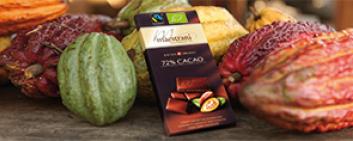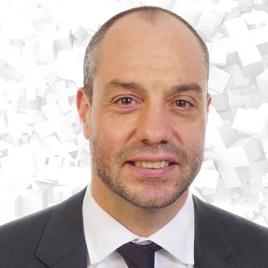Mr. Versloot, Hero – then “Conservenfabrik Lenzburg, Henckell und Zeiler” – was founded in 1886. You began exporting your products as early as 1910. What makes Hero so successful?
The quality of our products and brands, and the ability to understand local consumer needs. Finding the right partner and having a shared common interest are crucial. You need to be very clear about what you expect from your partners. What I have learned is that you need to make sure there is a balanced relationship. You need to create a value chain in which your partners can also make a living, especially if you want to develop a market.
You are active in more than 30 countries. What is your strategy for accessing foreign markets?
We try to classify our export markets into three categories: strategic, tactical and opportunistic. Strategic markets offer the biggest business potential. Ideally, this is where – over time – you want to establish yourself with a subsidiary or through an acquisition. I see exports to these markets as a first phase of business development. As the business grows in scale, we would probably change the business model and either acquire local partners or establish our own subsidiary, which we have done in several export markets over the years. These are also the markets where you would invest more in the future, and focus on growth rather than profit. Tactical markets are the ones which are still attractive, but which do not offer enough scale to establish your own business. However, you could certainly invest in these markets and help distributors build good market positions. Opportunistic markets are the ones to which you export products with minimal management attention or marketing efforts. Within this framework, however, you need to allow for sufficient flexibility and remain entrepreneurial.
Can you give an example?
A large part of our business is baby and toddler nutrition – more than 40 per cent of our portfolio. China is a good example. In 2008, Chinese consumers lost trust in the quality of domestically produced products due to the Melamine scandal. Local Chinese producers manipulated the infant milk formulae by taking out the protein and substituting it with Melamine, a synthetic component, which resulted in thousands of infants becoming sick, and sadly even a number of deaths. Soon after the scandal, our domestic sales in Europe started to grow. When we analyzed the sales, we found that Chinese consumers were buying our infant milk in Europe to take back to China. We reacted by opening an office in Shanghai and started working with distributors. Today, the export of infant milk products is one of our biggest export businesses. Even though this was not part of our strategy at the time, we identified a gap in the market and filled it.
What do you see as the biggest challenges for the food sector in the coming years?
The biggest challenge is to maintain the trust of consumers. Young consumers, in particular, are highly critical, demanding, and well-informed. I operate under the assumption that the world is without secrets. As a company, you have to make sure that everything you do can be put under the magnifying glass. Whatever you do must be done well. Unfortunately, the number of scandals in food and other industries has gained a lot of media attention, which makes consumers doubt their trust in brands. In the past, big brands used to have an advantage, but this is no longer the case, particularly among young consumers. You have to make a deliberate effort to be transparent. In the food sector, you see a great deal of smaller, purpose-driven brands grow, and traditional brands are beginning to struggle.
You launched the Bee Careful Initiative and are part of the Sustainable Agriculture Initiative. What do they do?
Bee Careful was launched by the Hero Group, initiated by our German subsidiary, and is our main Corporate Social Responsibility program. Bees are very important for the fruit crops and fruit diversity, and we use a great deal of fruit in our baby nutrition and jams. The aim of the project is to promote bee health through education and concrete initiatives being undertaken by our subsidiaries. This is a good cause, but there is a clear link to our portfolio, and our employees, myself included, are very enthusiastic about it. The Sustainable Agriculture Initiative is a non-profit organization which shares knowledge about sustainable agricultural practices. They work with farmers and suppliers to educate them on how to implement sustainable practices. As a food company, it is becoming more and more important to understand where your raw materials come from. In jams, for example, we used to buy fruit on the markets. Today, we have more contract farmers whom we know personally. They work in accordance with the practices of the initiative. In addition, consumers are more and more interested in the traceability of products. These trends have led to a change in our production process, where we now process much more fresh fruit compared to the past.
You sell gluten-free products in several markets…
Gluten-free food is a very interesting and fast developing segment. It used to be targeted at people with celiac disease, a gluten intolerance. Nowadays, however, it has become a health trend, especially in the USA, the UK, but also in Europe. The number of people diagnosed with celiac disease is developing, but not exponentially, whereas the sale of gluten-free products is growing exponentially. The main driver behind this growth is a rising interest in a healthy diet.
In Switzerland, you are well-known for röschti and ravioli. Are they sold abroad?
The top sellers in Switzerland are still Röschti and Ravioli – our business is even growing. Every Swiss person knows these two products. Outside Switzerland, however, we hardly do any business with röschti and ravioli, except exports to areas with German or Swiss Diasporas, but these products are very limited in terms of sales.
Hero was listed on the stock exchange and is now family-owned again…
Hero was listed on the Swiss stock exchange until 2003. Being a family-owned company is something we feel very good about. The values of our owners are intertwined with the way we do business. We have a long-term view and have been in the business for more than 125 years. We certainly have the ambition to continue that. Being in the hands of a family that does not want to sell the company but, rather, develop it step-by-step is something I feel is very precious. Furthermore, it is a good value proposition for consumers.
What is your vision for the future?
Hero is not the largest food company, but there is an opportunity for us to position ourselves as a natural and sustainable company. To have that strategic direction in the hands of a privately held company is extremely valuable. I want to align our company further with our mission statement, ‘to delight consumers by conserving the goodness of nature’. We are developing new ways of processing our products. This requires time and investment, for example, fresh fruit processing through our own sourcing. Moreover, there is still work to be done in the way we market our products. Our Swiss heritage and roots can help us achieve that.
This interview has been published in our Magazine for Foreign Trade GO! (german/french)
About the Hero Group
The Hero Group was founded in 1886 and is a Switzerland-based (Lenzburg) international food group focused on branded, natural consumer goods. Turnover of approximately CHF1.35 billion is realized in over 30 countries across the globe. The main brands include Hero, Schwartau, Vitrac, Beech-Nut, Semper, and Organix. The Hero Group employs around 4,300 people and is privately owned by the Dr. Arend Oetker family.
About Rob Versloot
Rob Versloot joined the Hero Group in 2009 and was appointed to the position of CEO in 2012. Versloot previously worked for Danone Early Life Nutrition in The Netherlands, Brazil, Indonesia, Russia and Switzerland. Versloot holds a degree in Management Science (University of Groningen, The Netherlands, 1992) and originally started his career in a start-up, focusing on product development and industrial design.












